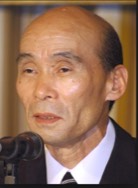The Sayama Case: Any End in Sight?
Links
http://www.imadr.org/sayama/
http://en.wikipedia.org/wiki/Sayama_Incident


JIADEP Note: Kazuo Ishikawa is a descendent of the Burakumin, a feudal caste which still face much discrimination today. This is the underlying reason why he was arrested. Interesting how the article completely omits this.
Confession-based convictions questioned
'Sayama case,' past trial reversals challenge interrogation legitimacy
By HIROSHI MATSUBARA
Japan Times
April 16, 2003
For more than a month after his arrest, Kazuo Ishikawa staunchly denied police allegations that he had raped and killed a high school girl in Sayama, Saitama Prefecture, in May 1963.
Kazuo Ishikawa, who is pressing the Supreme Court to re-examine his 1963 murder conviction, shows a picture that he says invalidates the evidence against him. HIROSHI MATSUBARA PHOTO
But then Ishikawa suddenly admitted to the charges -- after being grilled 15 hours a day by investigators.
"I did so because the investigators said they would arrest my brother, who was the breadwinner for my family, if I refused to confess," the 64-year-old Ishikawa said in a recent interview with The Japan Times.
"A police officer I trusted also said that I would be freed after spending 10 years in prison."
However, Ishikawa was sentenced to death after pleading guilty in the Urawa District Court in 1964. Following the ruling, Ishikawa was informed that his brother had an alibi. He recanted his confession and claimed innocence.
Ishikawa eventually lost his appeal in the Supreme Court in 1977 and was sentenced to life in prison. His story, widely known as the "Sayama case," is viewed by many legal experts as a typical example of a false conviction based on confessions obtained via lengthy police interrogations.
The nearly century-old Prison Law, which is likely to face review following recent revelations of the fatal abuse of inmates by guards at Nagoya Prison, enables interrogations to be conducted in police cells. The system has long been criticized by experts for allowing investigators to coerce suspects into confessions.
Since the end of World War II, there have been four cases in which defendants in criminal trials were sentenced to death but were then acquitted in retrials. In all of the cases, suspects were found guilty almost solely on the basis of their confessions to police or prosecutors.
Today, as throughout the history of Japan's criminal justice system, prosecutors typically go to trial armed with confessions. However, recent court decisions serve as reminders that investigators can resort to questionable, or even unlawful, means to garner confessions.
On Feb. 27, the Sapporo District Court acquitted two former presidents of the failed Hokkaido Takushoku Bank and a former head of a local land-development firm of aggravated breach of trust. The court ruled that one of the bankers had been "guided" by prosecutors to make self-incriminating confessions.
The following day, the Kyoto District Court acquitted a 46-year-old chief internist at a Kyoto public hospital on charges of poisoning his colleagues. Again the court ruled that the confession was coerced.
In both cases, prosecutors have appealed to higher courts.
Last September, the Tokyo High Court ruled that the confession of a Filipino woman accused of killing her Japanese lover in 1997 was invalid because it had been illegally obtained by police. The court determined that police officers confined and questioned the woman without a warrant either in a hotel room or a police dormitory for 10 days until she confessed, although it still found the woman guilty based on circumstantial evidence.
"The rulings may suggest that judges are finally realizing that it is their role to critically examine prosecutors' claims," said defense lawyer Kenzo Akiyama, who used to be a Tokyo High Court judge.
Akiyama said that Japan's criminal trial judges traditionally rely too much on confessions made during police and prosecutors' interrogations.
They often fail to objectively assess the credibility of such confessions, leading to false convictions, he said.
According to Sumio Hamada, a professor of psychology at Hanazono University in Kyoto, judges in Japan tend to uniformly accept confessions based on the belief that defendants -- particularly innocent ones -- would not dare say anything that could risk their lives.
"But suspects are compelled to tell such sad lies to end the lengthy interrogations by professional investigators during which suspects are denied any outside contact," said Hamada, who has assisted several convicts in their quest for retrials.
Currently, investigators are allowed to detain suspects for interrogation for up to 20 days per charge. If a suspect refuses to confess, investigators often extend their detention by serving a fresh warrant.
Hamada says that in police interrogations, emphasis is usually put on gaining confessions and apologies, rather than on collecting evidence, as suspects are assumed to be guilty.
"Under the current system, even strong-minded people can own up to crimes they didn't commit," he said.
Hamada points out that there are several ways to spot a false confession.
In many cases, such confessions are self-contradictory and are inconsistent with other pieces of evidence, he said.
In the Sayama case, for example, Ishikawa confessed that he wrote an extortion letter to the victim's family after killing her, although Ishikawa was almost illiterate at the time. He also claims that a footprint presented as evidence did not match his own.
As the 40th anniversary of the murder draws near, Ishikawa, who was paroled in 1994, is still pressing the Supreme Court to re-examine his case. He has also asked the top court to order prosecutors to disclose evidence that he says will prove that his confessions were false.
But judges tend to overlook inconsistencies in cases against defendants who confessed, said lawyer Akiyama.
"When it comes to questionable cases, judges prefer to side with prosecutors, as they feel it is safer," he said, adding that judges are more sympathetic toward prosecutors because they belong to judicial circles.
According to Akiyama, acquitting criminal suspects is also damaging to judges' upward career mobility.
"It is the mechanism behind the current 99.9 percent conviction rate in criminal trials," he said.
The Japan Federation of Bar Associations also says that Japan's judges tend to accept confessions obtained in closed-door interrogations without carefully examining if they were made voluntarily, and even give priority to such confessions over statements made by the defendants in the courtroom.
This practice runs counter to the modern criminal trial principle that all evidence must be examined in the courtroom. Legal experts say the principle compels judges to treat interrogation records as indirect evidence and thus fully examine how confessions were made.
Under current Justice Ministry policy, however, videotaping or tape-recording of the interrogation process is not required, making it virtually impossible to review how confessions are gained.


